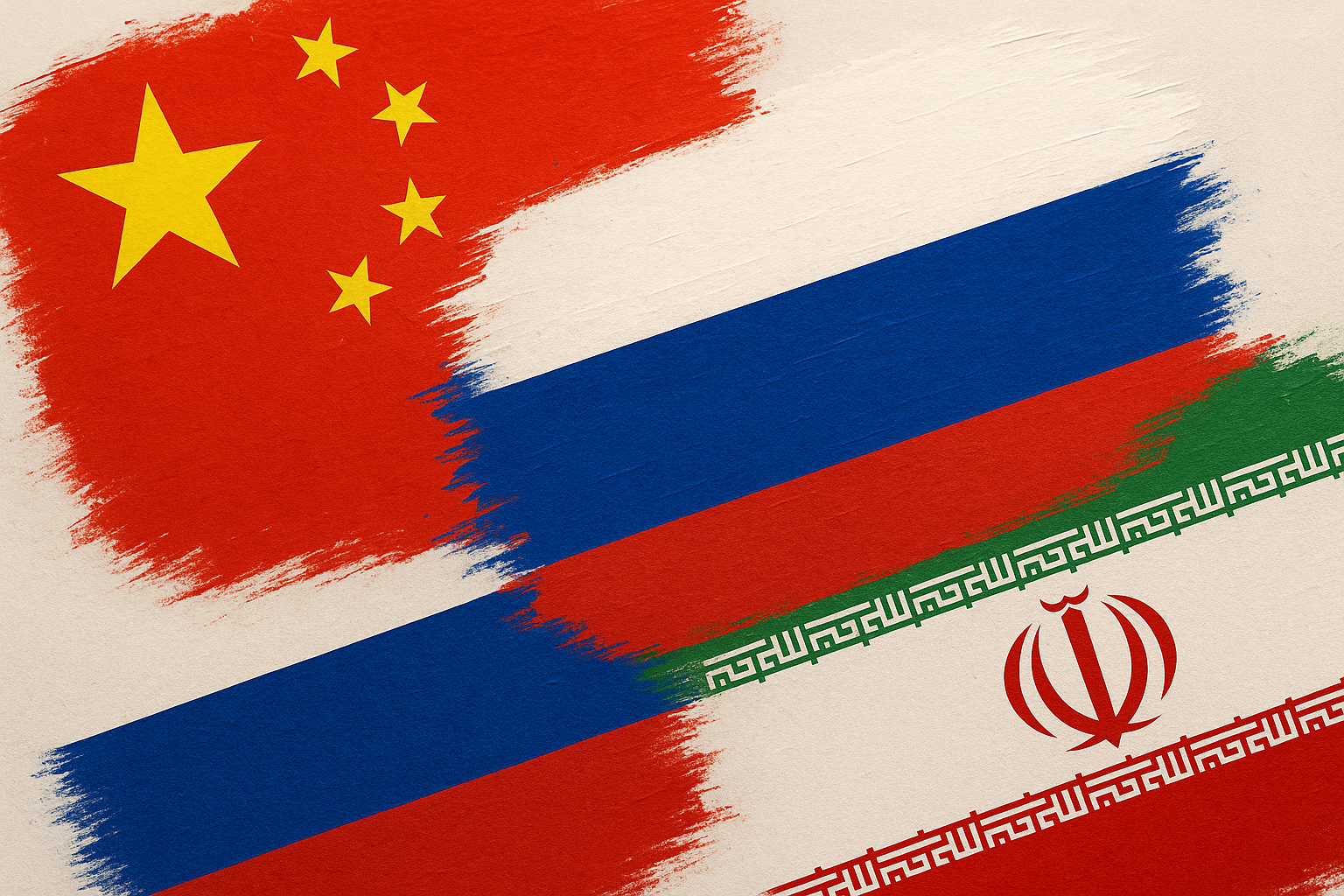China’s Sloppy Sanctions Busting: Beijing’s Open Support for Russia and Iran Signals Growing Strategic Desperation
Executive Summary
China’s once-cautious approach to sanctions evasion has become brazen, with Beijing now openly enabling Russia’s war effort and propping up Iran’s sanctioned regime as both partners become critical to Chinese strategic security. Recent admissions by senior Chinese officials, visible propaganda campaigns, and mounting intelligence on illegal oil and arms flows point to a regime willing to sacrifice international credibility in a desperate effort to avoid a collapse of its geopolitical buffer zones.
Key Judgements
1. China’s support for Russia’s war and Iran’s survival has become overt, with senior officials admitting Beijing cannot allow Moscow or Tehran to lose—exposing how both regimes are now strategic lifelines for the CCP.
Evidence: Chinese Foreign Minister Wang Yi privately told the EU China “cannot accept Russia losing” in Ukraine, and Chinese propaganda outlets warn “Iran’s defeat is a battle China cannot afford to lose” (CNN, MEMRI).
2. China’s sanctions evasion has become sloppy and poorly concealed, with “ghost fleets” moving Russian and Iranian oil, and Chinese components turning up in Russian drones and Iranian missile programs.
Evidence: Satellite tracking and Western intelligence confirm massive imports of sanctioned oil to Chinese “teapot” refineries, while Ukrainian and U.S. sanctions target Chinese companies for aiding Russia’s war machine (Fox Business, The Conversation).
3. Chinese arms, missile propellant precursors, and intelligence support are now openly tied to both Russia and Iran—despite Beijing’s denials—marking a dangerous shift from “plausible” to “implausible” deniability.
Evidence: U.S. Treasury, Defense, and European intelligence report Chinese dual-use tech and military parts in Russian and Iranian arsenals, while PLA officers and “observers” are present in Russia’s military (FDD, MEMRI).
4. China’s energy dependence and global ambitions are now inseparable from the fate of Moscow and Tehran, raising the stakes of any Western effort to pressure Beijing over sanctions busting.
Evidence: Over 90% of Iran’s oil now flows to China; Beijing’s discounted purchases and illicit shipping are Tehran’s economic lifeline, while Chinese-Russian trade has hit record levels despite G7 and EU caps (NPR, Fox Business).
5. China’s shift from covert evasion to overt defiance reflects a growing willingness to accept reputational and economic risk—raising the potential for direct U.S.-China confrontation over secondary sanctions and arms proliferation.
Evidence: Western governments, Ukraine, and the U.S. have all sanctioned and publicly named Chinese firms for direct support to Russian and Iranian militaries, while open Chinese propaganda calls for military alignment (The Conversation, Newsweek).
Analysis
China’s foreign policy has crossed a critical threshold: faced with the prospect of losing Russia as a strategic distraction in Europe and Iran as its energy lifeline in the Middle East, Beijing is now taking unprecedented risks to keep both regimes afloat. Wang Yi’s recent admission to the EU that “China cannot accept Russia losing,” amplified by social media messaging declaring “Iran’s defeat is a battle China cannot afford to lose,” signals a regime that has calculated it must openly defy the West to protect its own future.
The result is a sanctions evasion effort that is increasingly sloppy and visible. Chinese “ghost fleets”—oil tankers stripped of markings, using mid-sea transfers—funnel discounted Russian and Iranian oil to China’s private and state-run refineries. These operations, once shrouded in plausible deniability, are now tracked by Western intelligence, sanctioned by Treasury, and confirmed by customs data and satellite imagery. Meanwhile, Chinese components are showing up in Russian missiles, drones, and targeting systems in Ukraine, and U.S. and European sanctions have directly targeted Chinese tech suppliers and manufacturers.
China’s military support for Iran is following the same trajectory. Open source tracking and U.S. government analysis reveal a pipeline of Chinese missile precursors, drone parts, and—potentially—advanced air defense systems headed to Iran, as Tehran pivots away from an unreliable Moscow. Propaganda and official commentary inside China are unusually frank about the stakes: defeat for Iran would, in Beijing’s view, lead to Western control of Middle Eastern energy, encirclement of China’s sea lanes, and a direct threat to the Belt and Road Initiative.
Beijing’s willingness to risk further U.S. and EU sanctions—sacrificing plausible deniability—shows just how high it views the stakes. In doing so, it is inviting new forms of confrontation. The likelihood of secondary sanctions on Chinese banks, ports, and manufacturers is rising. The credibility of China’s “neutrality” claim is nearly gone, and the reputational cost among European and Asian partners is increasing. Yet for Xi Jinping, these risks are now preferable to the alternative: a world where the West is emboldened, Russia and Iran are isolated, and China stands alone.
For intelligence and policy professionals, this shift requires a recalibration. China’s external behavior is less restrained, more reckless, and—by necessity—more escalatory. Supply chains, energy markets, and defense networks will all feel the impact, and new forms of U.S.-China confrontation are now likely to play out across multiple theaters—from Ukraine and the Middle East to the Indo-Pacific.
Sources
CNN – China tells EU it can’t accept Russia losing its war against Ukraine, official says
MEMRI – If Iran Loses, Will It Have an Impact on China? Social Media Video
MEMRI – Chinese Military Analyst: China Cannot Accept Russian Defeat in Ukraine
Fox Business – ‘Ghost ships’ moving sanctioned Russian oil to China
The Conversation – Beijing’s ‘plausible deniability’ on arms supply is quickly becoming implausible
FDD – 5 Things to Know About China-Iran Security Cooperation
Newsweek – Iran Pivots From Russia to China in Quest for New Weapons After Israel War


